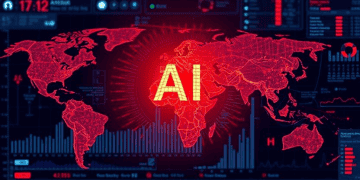The global market for artificial intelligence (AI) in warehousing is anticipated to grow from $11.4 billion in 2024 to $42.9 billion by 2030, with a compound annual growth rate (CAGR) of 24.8%, according to a recent market report.
The report outlines how AI is playing a crucial role in optimizing inventory management, streamlining warehouse operations, and improving overall efficiency. AI-powered technologies, including robotics like automated guided vehicles and drones, are increasingly being used for tasks such as product retrieval, inventory checks, and order fulfillment, which helps reduce dependency on manual labor.
The expansion of e-commerce and growing demand for faster delivery times are identified as key factors driving AI adoption in warehousing. AI technology enables real-time data analysis, predictive analytics, and autonomous systems that help warehouses enhance speed and accuracy in order processing.
The report also highlights how advances in robotics, machine learning, and big data analytics are further propelling AI adoption. Businesses are increasingly turning to automation to cut labor costs and improve decision-making processes.
In North America, the U.S. market for AI in warehousing is valued at $3 billion in 2024 and is expected to grow substantially. Canada is also included in the regional analysis, though no specific market figures are provided for the country.
The hardware segment of AI in warehousing is projected to reach $17.4 billion by 2030, growing at a rate of 21.3%, while AI-driven software is expected to expand at an annual rate of 26.9%.
Prominent companies operating in the AI warehousing sector include ABB Ltd., Amazon Web Services Inc., Google LLC, Honeywell International Inc., and IBM Corporation.
Stay updated with supply chain news at The Supply Chain Report. Learn more about international trade at ADAMftd.com with free tools.
#AIinWarehousing #SupplyChainInnovation #AutomationTechnology #EcommerceGrowth #AIinLogistics















